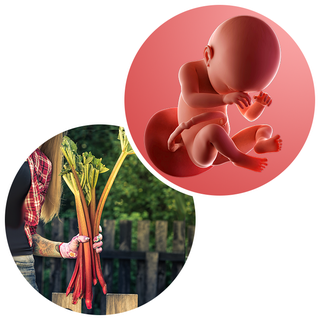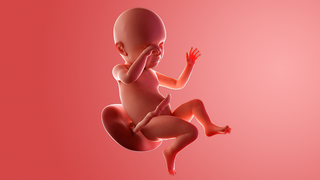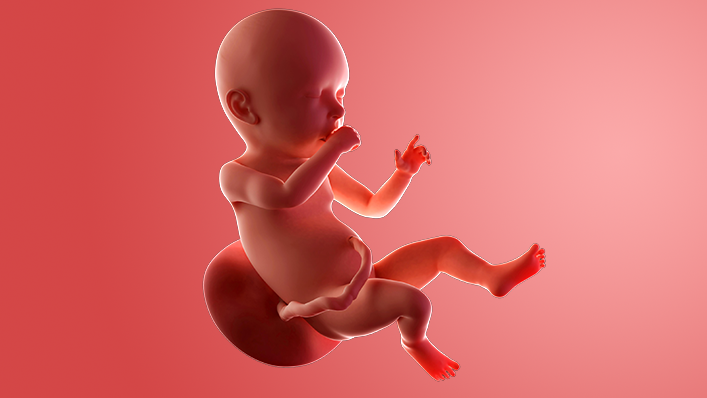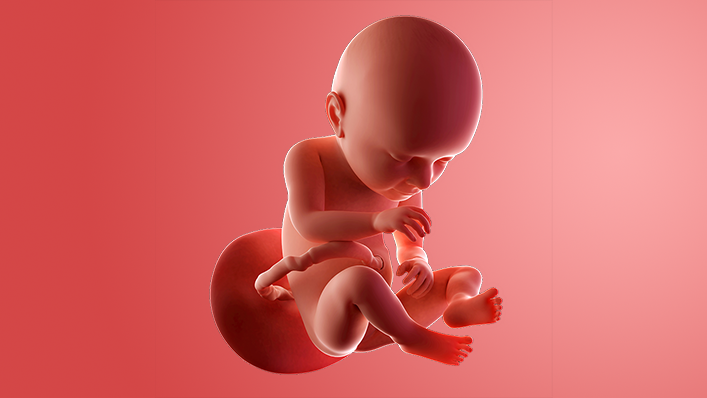What's happening in my body?
At your antenatal appointment, which is due around now, your midwife or doctor will measure the size of your bump with a tape measure and check your blood pressure.
They will also look for any protein in your urine that could indicate that you've got a dangerous condition called pre-eclampsia. This can happen in the 2nd half of pregnancy or after the baby is delivered.
If you're having a planned caesarean, otherwise known as an elective caesarean, then you'll probably be booked in when you're at least 39 weeks' pregnant. This is to give your baby's lungs the best chance of being fully developed.
You'll have a chat about what might happen if you go beyond 41 weeks. There could be risks for you or the baby, so you may be offered an induction. This is where labour can be brought on artificially by putting a tablet or gel in your vagina. Around 1 in 5 labours are started this way.
RSV vaccination
Have you had the RSV (respiratory syncytial virus) vaccine? It's usually offered at around week 28 but can be given later if needed, right up until you go into labour.
Having the vaccination can lower your baby's risk of a severe lung infection called bronchiolitis, which can make it difficult for your baby to breathe and feed. If you've not had it yet, speak to your midwife or a GP.
5 tips for a happy home birth
Around 1 in 50 women in England have their babies at home, supported by a midwife.
Here are some tips for a happy, healthy home birth:
- Be organised and have everything put aside for the big day, which should include something to wear in labour, a nursing bra, breast pads, maternity pads and new-baby essentials.
- Plan pain relief with your midwife. You may want a TENS machine, a birthing ball and a birthing pool. You can arrange for your midwife to bring Entonox (gas and air) and pethidine on the day.
- Put aside some towels and waterproof sheets – you'll need them to soak up the fluids.
- Think about the atmosphere you'd like to create – will you burn scented candles and play your favourite music?
- Have a bag packed just in case there are complications and you need to get to hospital in a hurry. Week 33 has advice on what to pack.
Flexibility is the key, whatever type of birth you choose. Ultimately your baby is the boss – and all everyone wants for you is a safe, peaceful delivery.
Baby slings and carriers
If you're thinking of buying a baby sling or carrier for when your baby arrives, make sure you know how to use one safely. You can find safety advice in our guide on what to buy for your newborn baby.
3rd trimester pregnancy symptoms (at 38 weeks)
One new symptom this week could be frustration or even boredom. It really won't be long now, try to be patient!
Your signs of pregnancy could also include:
- painless contractions around your bump, known as Braxton Hicks contractions
- sleeping problems (week 19 has information on feeling tired)
- stretch marks (week 17 has information on stretch marks)
- swollen and bleeding gums (week 13 has information on gum health during pregnancy)
- pains on the side of your baby bump, caused by your expanding womb ("round ligament pains")
- piles (week 22 has information on piles)
- headaches (read about headaches in pregnancy on NHS.uk)
- backache
- indigestion and heartburn (week 25 has information on digestive problems)
- bloating and constipation (week 10 has information on bloating)
- leg cramps (week 20 has information on how to deal with cramp)
- feeling hot
- dizziness
- swollen hands and feet
- urine infections
- vaginal infections (week 15 has information on vaginal health)
- darkened skin on your face or brown patches – this is known as chloasma or the "mask of pregnancy"
- greasier, spotty skin
- thicker and shinier hair
You may also experience symptoms from earlier weeks, such as:
- mood swings (week 8 has information on mood swings)
- morning sickness (week 6 has information on dealing with morning sickness)
- weird pregnancy cravings (week 5 has information on pregnancy cravings)
- a heightened sense of smell
- sore or leaky breasts (week 14 has information on breast pain) – a white milky pregnancy discharge from your vagina and light spotting (seek medical advice for any bleeding)
What does my baby look like?
Your baby, or foetus, is around 49.8cm long from head to heel. That's approximately the length of a stick of rhubarb.
In the 2nd trimester, your baby was covered in a furry coat of soft, downy hair (lanugo). That's mostly gone now, although some babies are born with patches here and there.
Your baby is storing up some sticky green slime in their bowels (meconium). This is made up of everything they swallow in the womb, including bits of amniotic fluid and hair. It will normally come out after the birth as the first poo.
If the baby does a poo during labour, it can be a sign of distress and your baby will need close monitoring.

Action stations
Are you feeling cooped up at home? It's fine to go for a walk outside to get some fresh air, but take your notes with you just in case.
This week you could also...
More in week-by-week

Week 39
Pregnancy normally lasts around 40 weeks and most women will go into labour a week either side of their due date. That means any day now.
More in week-by-week guide to pregnancy


